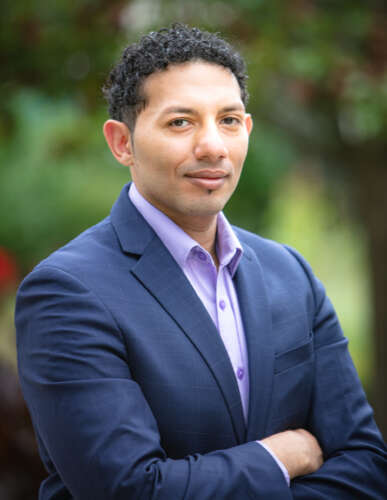In the early months of COVID-19, the nightly refrain of people banging pots and pans to drum up support for doctors and nurses on the frontlines of what would become a full-blown pandemic echoed around the world, a familiar sound of gratitude at a time when so much was unknown.

More recently, as the public’s attention turned to the mental and physical health of medical professionals, University of Guelph researcher Dr. Basem Gohar sought a grant from the Canadian Institutes of Health Research to look more closely at the health care professionals seemingly forgotten.
Gohar, a clinical psychologist and professor in the Department of Population Medicine at the Ontario Veterinary College, led the rapid review conducted by his lab team, including Liam Ishaky, a master of public health student, and Dr. Myuri Sivanthan, a post-doctoral fellow, to examine the impact the pandemic had on the mental health of medical lab professionals, physical and occupational therapists.
In a digital search of nearly 9,000 articles, researchers removed duplicates to qualitatively assess 72 studies, of which 16 met the review’s criteria. They found poor mental health outcomes among all occupational groups that included burnout, depression and anxiety.
Increased workloads were significant contributors to poor mental health across the board.
In many cases, Gohar said, it has led to moral distress, resulting in health care providers leaving the profession entirely. “This is an issue many people are facing,” he said. “The feeling that if they stop working patients will suffer.”
Mental health challenging for respiratory therapists, pharmacists
The findings were published in AIMS Public Health and prompted Gohar to expand the scope of research to include mental health data for respiratory therapists and pharmacists. Further research with these occupational groups is ongoing.
High levels of stress reported among these health care professionals were often overlooked, despite their presence on the front lines of daily patient care, Gohar pointed out.
“When people talk about COVID, they talk about mortality, and they talk about vaccines,” he said. People don’t necessarily think about patients diagnosed with COVID who spent time in hospital and then required support to leave – the kind of care physical and occupational therapists provide.
“If you’re on a ventilator for a couple weeks in hospital, you’re not going to have any muscle tone and be in need of a physical therapist,” he said. “An occupational therapist is going to be making recommendations for your life outside the hospital so you can function.”
These professions are heavily understudied, rarely acknowledged and in crisis, Gohar said. Practitioners have worked overtime, postponed vacations and in some cases, been replaced by retirees in their field as burnout gave way to turnover.
The nature of the work medical lab professionals do is isolating and contributed to feeling underappreciated and forgotten, findings show. Gohar likens their “behind-the-scenes” roles to “working in the shadows.” Similarly lesser-known professions like respiratory therapy didn’t reach the average person’s radar until the pandemic, he said.
Health care challenges are global
The study reviewed data from Europe, Asia, Africa, and North and South America.
“This is a global issue,” he said. “When we look at it from a global perspective, we are able to give better recommendations.”
Researchers say improving workplace cultures and increasing education in hospital and community settings will help the broader public understand who their health care workers are and how they integrate in a multi-disciplinary system.
“Without medical lab professionals, you don’t have medicine. You can’t have diagnoses and treatment without data and data comes from the lab,” Gohar said.
“You can’t have people intubated without respiratory therapists. You can’t transition to out-patient care without physical therapists and occupational therapists.
“You can’t have proper medical evaluations and vaccinations, or consultations about medication without pharmacists. And, you can’t have pharmacists without pharmacy technicians.
“It’s a collective.”
Contact:
Dr. Basem Gohar
bgohar@uoguelph.ca
